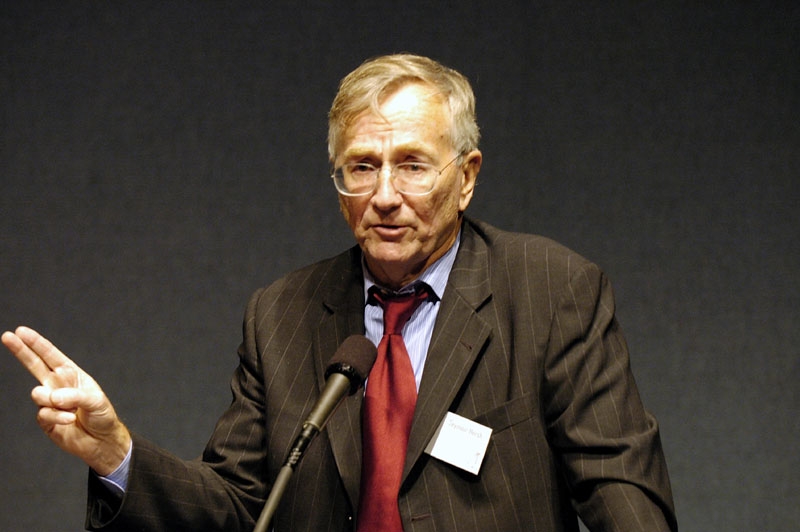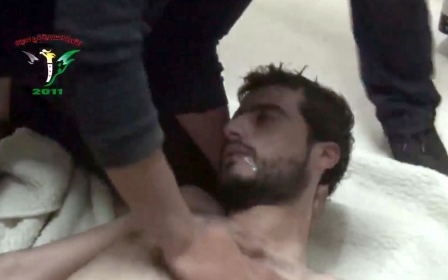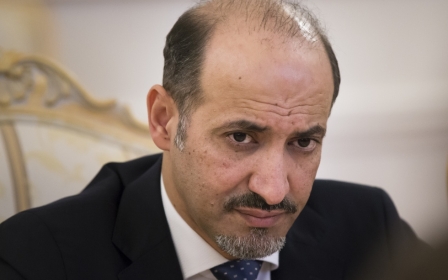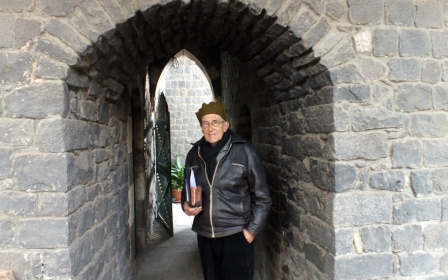Seymour Hersh and toxic propaganda in Syria

Seymour Hersh has made a career out of scaring powerful people in high places. His uncovering of the My Lai massacre in 1969, in which he exposed an attempt by Washington to cover up a mass killing of villagers in the Vietnam War, made Hersh's name as one of America’s most fearless investigative journalists.
This reputation is likely why the latest in a series of articles Hersh is writing on the Syrian civil war made such an impact. In “The Red Line and the Rat Line”, published in March by the London Review of Books, the influential journalist reported that an infamous sarin gas attack last year in Syria was not launched by the government as many believed, but rather by rebel forces in a “false flag” operation.
When there are differing accounts, all agree that in the early morning of 21 August 2013 a series of explosions ripped through the Ghouta suburbs of Damascus. The lack of physical wounds among the injured suggested that the dead – estimated by various sourced as numbering from “at least 281” to “1,729” – had been killed in a poison gas attack.
In the following days, as amateur video surfaced with ghastly evidence of the strike’s deadly impact, accusations quickly began to fly over who launched it.
The Syrian opposition and their supporters blamed Syrian President Bashar Al-Assad, who has been brutally quashing an ongoing rebellion since 2011 and was known to have a sizeable stockpile of chemical weapons. The Assad government and international allies including Russia accused rebel forces, and culpability soon descended into a propaganda war.
Siding with the rebels, the US and Western allies such as Britain and France initially threatened military intervention in the wake of the atrocity. However, by September all had backed out following a Russian-brokered deal that required Assad to destroy all his chemical weapons within a year.
‘Something spectacular’
Since the deal was achieved, there was been a marked quiet among the international community on the issue of final responsibility. However, this silence was rocked by Hersh’s latest article.
In his piece, Hersh effectively says the attack was conducted covertly by the government of Turkey, with the intention of provoking the Americans and NATO into intervening militarily in Syria’s civil war. US President Barack Obama had said in August 2012 that the use of chemical and biological weapons would cross a “red line” – a heavy hint of military intervention.
"[This] was a covert action planned by [Turkish Prime Minister Recep Tayyip] Erdoğan’s people to push Obama over the red line,” says an anonymous source in Hersh’s article. “They [Ankara] had to escalate to a gas attack in or near Damascus when the UN inspectors were there”.
“The deal was to do something spectacular. Our senior military officers have been told by the DIA [US Defense Intelligence Agency] and other intelligence assets that the sarin was supplied through Turkey – that it could only have gotten there with Turkish support. The Turks also provided the training in producing the sarin and handling it,’ adds the source.
If true, such revelations would be political dynamite. Erdogan’s government has already been under pressure over a leaked video on YouTube in which the head of the security services, Hakan Fidan, talks of the potential of launching a false flag attack on Turkish soil.
A poll conducted by Kadir Has University in February showed the Turkish public as overwhelmingly opposed to unilateral intervention in Syria, with 79% saying that only the “existence of a direct threat against Turkey” would justify military action.
A manipulated threat
This underlines how difficult it would be for Erdogan to convince the Turkish people of the validity of going to war with its neighbour – unless there was a major game-changing event. An attack within Turkish territory on the Suleyman Shah tomb, which contains the remains of the grandfather of the founder of the Ottoman Empire, Osman I, would clearly be such an event. As would the potential threat of a chemical weapons attack.
Hersh asserts that a comparison of samples from Ghouta stored in the Porton Down facility in Britain with a samples provided by Russian intelligence "demonstrated that the gas used didn’t match the batches known to exist in the Syrian army’s chemical weapons arsenal". He says it is this that this led to Obama finally cancel an attack on Syria.
Despite the seemingly high level of evidence, Turkey and the US have acted quickly to deny the accusations in Hersh’s article.
“In light of our reports and intelligence we had received, we believe beyond any doubt that the attack on 21 August was carried out by the Syrian regime and we are still behind the same view shared by the international community,” US state department spokesperson Jen Psaki said in a press briefing on April 9.
Paul Schulte, senior visiting fellow in the Centre for Defence Studies at King's College London, agrees that the Hersh scenario seems implausible. He questions Turkey’s ability to carry out such an operation.
“The capability of sending sarin in and arranging for it to be fired in by Al-Nusra in ambiguous circumstances…who knows? What you’re describing is a kind of intelligence black op, it’s hard to do, no organisation specialise in this, and chemical attacks are rare." Schulte told the Middle East Eye.
Schulte said that the sort of operation being hypothesised in the Hersh article would carry overwhelming risk. "It was suggested that the rebels had done it themselves. Well, you’d have to be very, very confident that you could survive the investigation long term and risk destroying your believability and international sympathy. I don’t think the rebels were that confident, I don’t think the Turks could have been that confident.”
Schulte says the article’s assertions are undermined by a “lack of evidence that can be traced. He [Hersh] is relying on a series of unnamed contacts.”
A Turkey-al Nusra nexus?
However, Jeremy Salt, an associate professor of Middle Eastern history and politics at Bilkent University in Ankara, Turkey, says that the article holds merit:
“There are people here [Turkey] that don’t like this government, but they’re still saying this is still so outrageous it can’t possibly be true, it’s a conspiracy theory – they can’t prove that it’s a conspiracy theory, but they’re saying it.”
In May 2013, the Turkish police arrested 12 terror suspects in Istanbul and in the provinces of Adana and Mersin who were allegedly linked to the al-Qaeda affiliated Syrian rebel group, the Al-Nusra Front. The blogosphere became excited when it was initially suggested that they had 2kg of sarin nerve gas in their possession. Later, however, Turkish officials changed their assessment claiming that they were instead in possession of “anti-freeze”.
Salt dismisses claims that Hersh could have duped by false documents, as alleged by Jeffrey Lewis in the security blog Arms Control Wonk:
“Seymour Hersh is a very experienced reporter and he’s been dealing with these people for decades", Salt told MEE. "He’s not the kind of person who’s going to be sucked in by someone giving him a false document and trying to pull the wool over his eyes. My view is that this was a false flag operation pushed by someone."
Numerous points of controversy have marked the debate over the chemical attack. The issue over the viability of rockets being launched from rebel positions or army base positions has been one such contention. The Brown Moses blog run by weapons analyst Eliot Higgins has been a regular critic of Hersh over his sarin articles.
Hersh’s latest article "fails to address how eight to 12, two-meter long perfect copies of Volcano rockets were produced and transported from Turkey to Damascus, along with hundreds of litres of Sarin precursors, and the required equipment to mix it and pour it into the warheads,'" writes the blogger in a recent post.
One of the main reasons why the debate over chemicals weapons in Syria continues is that the report released by the UN into the original attacks in Ghouta did not apportion blame and the issue of culpability has, seemingly, fallen off the geopolitical agenda.
The success in convincing Assad to agree to give up his stockpile, half of which has now been removed from the country, was hailed as a diplomatic victory by both sides. It made Russian President Vladimir Putin look like a kingmaker – the man who through diplomacy and level-headedness managed to prevent a Western invasion of Syria. It also provided Obama with a neat way of retreating from a military intervention without looking weak and ineffectual. Neither side seems interested in assigning blame.
“I find the media position on this is 'well, it's all going well, it's a triumph for international cooperation' and all the attention's turning to the Ukraine so nobody's interested” says Schulte. “It seems to me very interesting that the international community is incapable of systematically investigating the murders of 1,500 people, in front of TV cameras. Until there’s a detailed investigation of evidence rather than this sort of throwing around of hearsay, we’re not going to know."
Schulte highlighted an exchange on the BBC Radio 4 programme File on Four on 7 January 2014, featuring an interview with Hugh Gregg from the Organisation for the Prohibition of Chemical Weapons (OPCW). In the interview, Gregg acknowledges that the OPCW has access to the Assad regime’s chemicals, but the decision whether to take them for sampling at their lab was now a "political question". He acknowledges that if they were mandated to do so, it would be possible to "narrow down" the chemicals involved.
Later in the same programme, the reporter put the question of accountability to Malik Ellahi, another spokesperson for the OPCW. "Well, as you know there was an investigation and it actually proved that chemical weapons were used in Syria. There was no attribution as such, but I mean chemical weapons anywhere in the world is a serious problem for anyone...I think the solution was to get rid of chemical weapons from Syria and that’s what the international community agreed on eventually."
MEE contacted the OPCW to elaborate, but was told they would not be commenting on the issue of culpability and that I should "refer any questions that you have on the matter to the UN".
One of the most notorious “false flags” in recent history occurred in the war which made Hersh’s name.
Suspicions over the Gulf of Tonkin incident, which drew America into the Vietnam War after North Vietnamese ships allegedly fired on an American navy vessel, was for decades the stuff of conspiracy theorists and marginalised investigative journalists.
It wasn’t until NSA records were declassified in 2005 that it was finally confirmed that information regarding the incident had been distorted to give America a smoking gun to invade North Vietnam.
There will be a lot of fingers pointed during the course of the Syrian war, but the fog of war is still creating confusion and it may not be until years after the dust has settled, and many more live have been ruined and lost, that it will finally be able to prove who did and who didn’t have chemical weapons in Syria.
Middle East Eye propose une couverture et une analyse indépendantes et incomparables du Moyen-Orient, de l’Afrique du Nord et d’autres régions du monde. Pour en savoir plus sur la reprise de ce contenu et les frais qui s’appliquent, veuillez remplir ce formulaire [en anglais]. Pour en savoir plus sur MEE, cliquez ici [en anglais].




